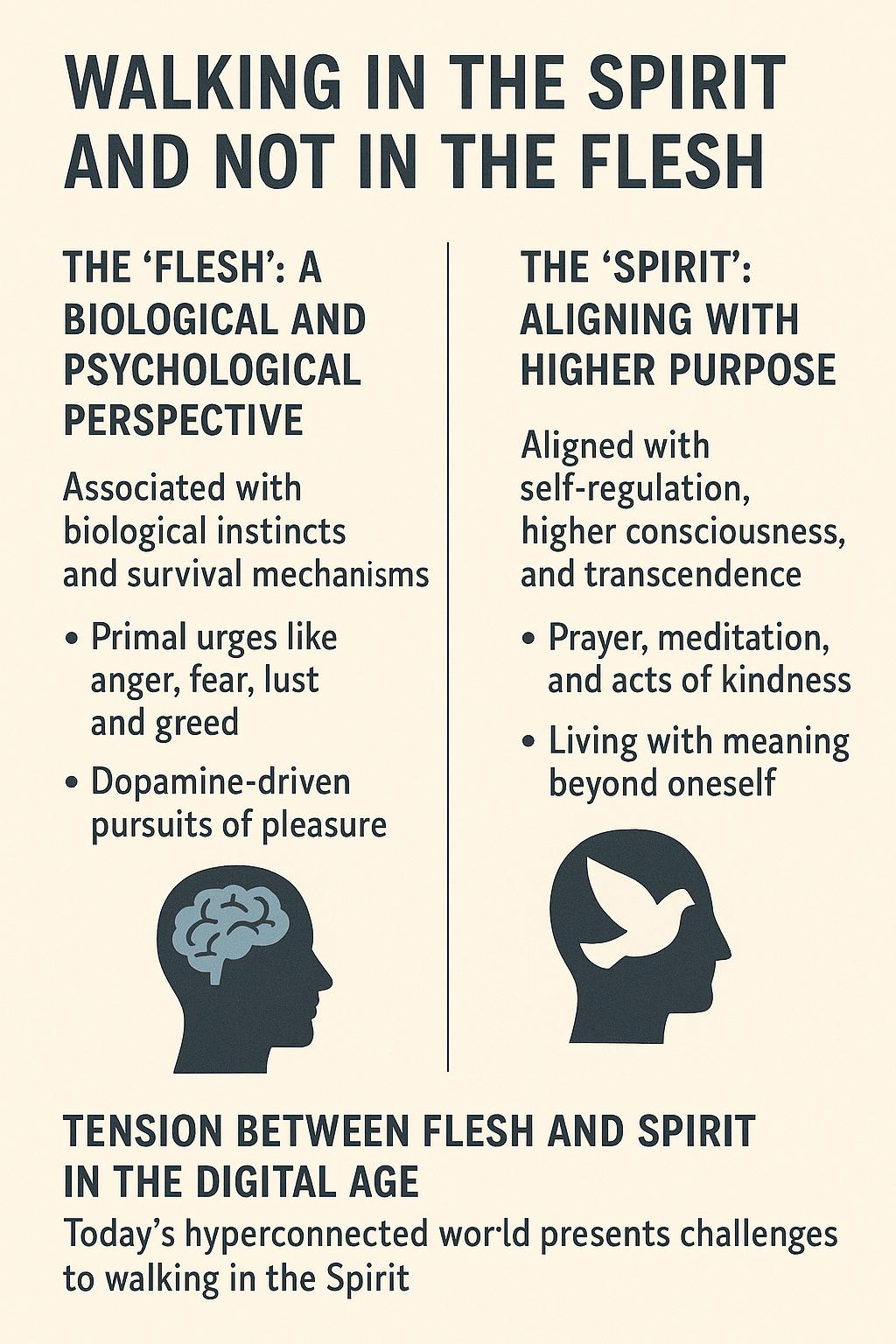Walking in the Spirit and Not in the Flesh: A Reflection in Light of Modern Science

In the pages of Scripture, the Apostle Paul presents a profound contrast between two ways of living: “walking in the Spirit” and “walking in the flesh” (Galatians 5:16–26; Romans 8:1–14). While these concepts were penned almost two millennia ago, they resonate deeply even in our modern, science-driven age. As we explore these timeless truths, we find striking parallels—and even cautionary insights—when viewed through the lens of contemporary science.
The “Flesh”: A Biological and Psychological Perspective
In modern terms, the “flesh” can be associated with our biological instincts and survival mechanisms. Neurologically, much of what Paul calls “the flesh” aligns with the limbic system, the seat of our emotions, drives, and impulses—anger, fear, lust, and greed. These are the primal urges that have helped humanity survive in dangerous environments but can also lead to destructive behaviors when left unchecked.
For example, dopamine-driven pursuits of pleasure, such as constant stimulation from technology, consumerism, or substances, are akin to walking in the flesh. Our society is increasingly aware of how addictions—whether to screens, food, substances, or even status—can hijack the brain’s reward system, creating cycles of temporary highs followed by deeper emptiness. Neuroscience confirms what Paul wrote centuries ago: a life dominated by these impulses leads to frustration, brokenness, and ultimately, a kind of spiritual and relational death.
The “Spirit”: Aligning with Higher Purpose
In contrast, “walking in the Spirit” resembles what modern psychology calls self-regulation, higher consciousness, and transcendence. It is the ability to delay gratification, to act out of love and compassion rather than fear or selfishness. Neuroscientific research suggests that practices like prayer, meditation, and acts of kindness literally reshape the brain, fostering resilience, empathy, and joy. This echoes Paul’s description of the “fruit of the Spirit”: love, joy, peace, patience, kindness, goodness, faithfulness, gentleness, and self-control.
Moreover, modern science increasingly acknowledges the importance of purpose and connection for human flourishing. Studies in positive psychology show that people who live with a sense of meaning beyond themselves—whether through faith, family, or service—report higher levels of well-being. In this way, the biblical call to “walk in the Spirit” aligns with the scientific understanding that human beings are healthiest when they transcend self-centered pursuits and live for a greater purpose.
Tension Between Flesh and Spirit in the Digital Age
Today’s hyperconnected world, shaped by technological advancements, presents unique challenges to walking in the Spirit. Algorithms designed to maximize engagement often exploit our fleshly tendencies—fear, outrage, and desire for validation. Social media, consumer culture, and the instant gratification economy reinforce a “fleshly” mindset, tempting us to focus on self-image, material gain, and fleeting pleasures.
Yet, these same tools can also be harnessed for good. Science and technology, when guided by wisdom and moral vision, can promote human flourishing. Medical breakthroughs, environmental innovations, and global communication networks can be servants of the Spirit when they foster healing, justice, and connection rather than division and excess.
A Call for Integration
Ultimately, Paul’s call to “walk in the Spirit” is an invitation to transcend our base instincts—not by denying our humanity, but by aligning our lives with divine purpose and love. Modern science confirms the wisdom of this path: a life rooted in love, self-control, and community leads not only to spiritual wholeness but also to mental and physical well-being.
Thus, the ancient wisdom of Scripture and the discoveries of modern science need not be at odds. Together, they point toward a holistic vision of human flourishing—one where we honor our biology, master our impulses, and open ourselves to the transforming power of the Spirit.






